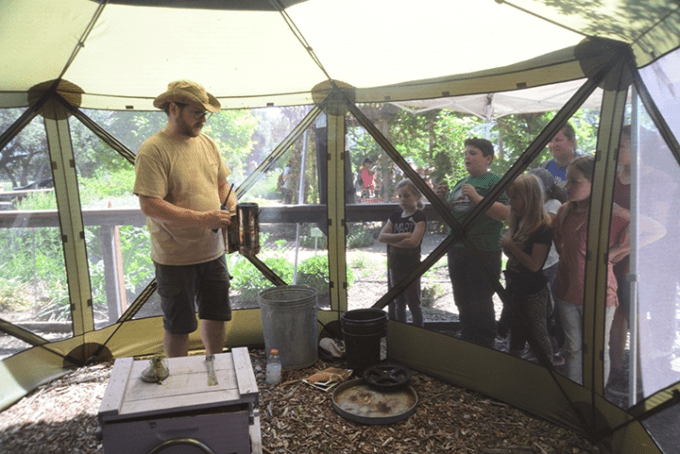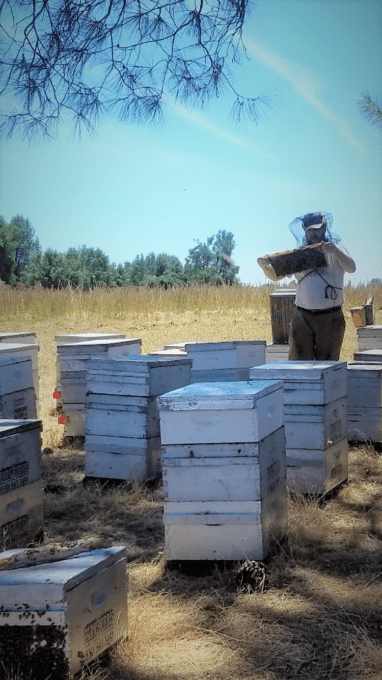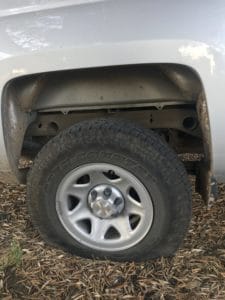Forward: For my first blog post I was asked to write about my perspective of joining BIP as a tech transfer team member. I have been in the field so much that I am just now getting around to it. I hope this blog accurately captures both the factual and emotional aspects of becoming a BIP tech team member.
So here it goes…
It’s About The Bees!

As one of the rookies on the Bee Informed Partnership (BIP) tech transfer team, I feel incredibly lucky to have joined BIP at such an interesting time for the organization, and for the beekeeping industry itself. On the first day of my new job, however, I was a bit worried that maybe I had made a mistake. When I showed up at the E. L. Niño Bee Lab everyone was outside in the UC Davis Bee Haven garden preparing for the outreach event happening that day. Wanting to make a good impression I volunteered to help out in any way possible. I was given the job of working the live honey bee tent. I had no idea what that meant. Turns out the job entailed showing live bees to a swarm of 100 third graders while trapped inside a tent that was baking in full sun. 24 hours earlier I was walking through snow in cool Colorado but now was in sunny California wondering about symptoms of heat stroke. I made it through the day without any permanent health issues and was assured this was not a typical day for BIP Tech Team members.
During the next two months on the job, I gained a great amount of respect and was extremely impressed by the knowledge of the veteran tech team members: Ben Sallmann, Dan Aurell, Dan Wyns and Rob Snyder. In addition, the entire BIP organization appeared to be blossoming into a finely tuned, well-managed, mature organization. The potential to provide even more value to the industry grows with each piece of scientific data collected. The data BIP collects and analyzes increasingly informs more efficient and effective beekeeping practices, promoting honey bee health while considering the needs of beekeepers.

I have seen BIP successfully bring together the academic side of honey bee health with the commercial side. Using input from scientists, researchers, statisticians and software developers combined with the “real world” experience from commercial beekeepers, sideliners, growers and applicators, effective best practices are developed and continually refined. BIP deploys in-the-field tech teams to collect field data and samples often working side by side with commercial beekeepers. Those samples get sent to the BIP lab who analyze them to generate more data. Samples can include live, sick or dead honey bees, brood, wax, pollen, bee

bread or syrup and can be analyzed for Varroa mites, Nosema, viruses, foulbrood, pesticides and more. The BIP scientists and software developers provide reports to evaluate the data and give beekeepers valuable feedback on the health of their colonies. Every step in the process is constantly being refined and improved upon. At BIP inception, tech teams were tracking data with handwritten notes. Today, tech teams are using tablets in the field which synchronize with the cloud in a single click. Reports can be automatically generated with just one more click. Even these BIP reports are being refined and improved upon on a continuous basis. On an individual level I am taking the best processes learned from my training and other tech team members, then refining them to fit my own style and become more efficient in the field (including becoming more efficient at changing out a flat tire!). Most recently I have seen hazard quotient calculations added to the BIP pesticide report to objectively gauge the risk of each pesticide found in a particular sample. I know of no other organization that provides beekeepers with this breadth of data driven evidence.
I never dreamed that my thirst for knowledge about all things honey bees could ever be satisfied and maybe that is a good thing because it drives my scientific inquiry. Poet Chinonye Chidolue said “The river of knowledge knows no depth.” In the past 2 months, I have just started to learn and am still discovering how to swim in BIP’s river of knowledge. Not only are the teams at BIP incredibly educated but they are a pleasure to work with. Experiencing the synergy of the intelligent people at BIP working towards common goals has been a great experience. The goals are always built on evidence based practices and are focused on honey bee health and beekeepers. Often I hear hobby level beekeepers applying a human centric perspective to their beekeeping practices, for example, not wanting to take small bee samples to obtain accurate data on colony health or believing that “natural” beekeeping practices dictate not feeding or treating bees. Best practices should be based on scientific data. BIP is all about the data which is why BIP is the place for me. It’s not about the human ethos. It’s not about you. It’s about the bees!
